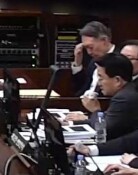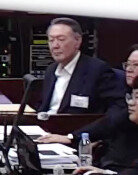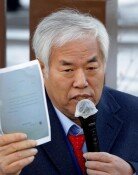Trick of hometown-based voting system
Trick of hometown-based voting system
Posted March. 20, 2015 07:18,
In 1812 in the revision of the Senates election law, the U.S. governor of Massachusetts, Elbridge Gerry, deliberately modified the constituency boundaries for electoral advantage of the Republican Party. The opposition party likened the shape of the modified constituency to salamander and criticized it by coining a word, gerrymander. It is not difficult to witness the gerrymandering, the act of going against the election principle by carving voting districts in a way that gives one party an unfair advantage in elections during Korean National Assemblys discussion over electoral districts.
Rep. Hwang Joo-hong (Jangheung-Gangjin-Yeongam in South Jeolla Province) of the New Politics Alliance for Democracy proposed the so-called Hometown-based voting system bill. According to the newly-proposed system, voters can choose the district where they can exercise their voting rights such as their birthplaces (hometown) or places of family register regardless of resident registration place. When people who have left their hometowns can select the place as their voting district, a local constituency that has to be removed due to insufficient population size can remain without being merged with other constituencies. The idea was officially proposed after it had been talked about by lawmakers whose constituencies are mainly rural areas and, hence, targets to be merged.
As the National Assemblys Special Committee on Political Reform discussed demarcation of electoral districts for the 2016 general elections at its first meeting on Thursday, lawmakers from farming and fishing communities on the both parties whose constituencies are in danger of being eliminated are on the alert. The ruling Saenuri Partys Hwang Yeong-cheol (Hongcheon-Hoengseong in Gangwon Province) proposed a revision that prohibits the area of electoral district from being twice the size of the average of entire electoral district. Although the Constitutional Court ruled in October 2014 that it is unconstitutional if population gap between a larger and a smaller electoral districts is higher than two to one since it goes against equivalence principle, the proposed revision is trying to prevent farming and fishing communities from being integrated on the ground of area standard.
Arguing that a comprehensive integration of constituencies of farming and fishing villages based only on population size could take away or distort representative nature of different regions with different history and tradition, some lawmakers formed a group for protecting the sovereignty of farming and fishing communities. If the current single-member constituency system is replaced with the medium and major one, farming and fishing villages can maintain the current number of their lawmakers, which seems unfeasible. That being said, if it is tried to go beyond the act of gerrymandering and play a trick by going against the dominant principle of the Public Official Election Act that stipulates to count the population size based on resident registration place, it would not be very persuasive.
swpark@donga.com







